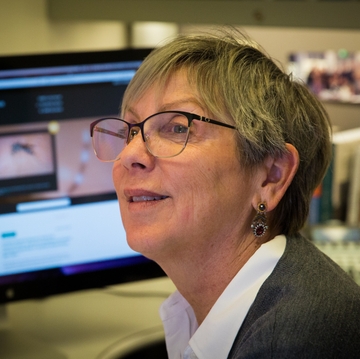Program Provides Research Opportunities for Undergraduate Students

Information is Power
Improved Data Collection Saves Lives
Kimberly Page, PhD, MPH, professor in the Department of Internal Medicine, always felt that her roots in New Mexico would one day call her home.
When she was a child, her father - a native New Mexican and UNM graduate - moved her family from the U.S. to South America for his job in the petroleum industry. Growing up, she learned Spanish, English and Portuguese, as well as cultural flexibility.
Back in the States, she pursued an MPH and PhD in epidemiology from the University of California, Berkeley, and a position at the Center for AIDS Prevention Studies at the University of California, San Francisco.
Epidemiology - the study of disease through its natural history, cause and distribution - embodies an aspect of science that Page feels is sometimes overlooked.
"The creative part of science is sometimes also not just your great discoveries," she says, "but also how can we find better ways to get information." And in Page's field, the collection of information is everything. She is constantly searching for new techniques and tools from other fields that could advance her research.
Page studied HIV patients in San Francisco in 1990 to calculate their risk of contracting a newly discovered blood-borne virus, hepatitis C, which was damaging patients' livers, sometime leading to liver cancer. The Centers for Disease Control and Prevention estimates that 3.5 million people currently live with chronic hepatitis C infection in the U.S.
The virus is difficult to detect until two months after patients have been exposed, so Page and her team innovated methods to detect the virus earlier in injected drug users.
"We have put ourselves - nationally and internationally - on the map with our knowledge of acute hepatitis infection and natural history thereafter," she says. Page has collaborated with anthropologists and immunologists in her search for patterns in large data sets. "My work has been very, very multidisciplinary and trans-disciplinary," she says.
Her familiarity with different cultures helped as she began research collaborations across the globe, including Australia, Canada, Brazil, Cambodia and Thailand. She has trained scientists around the world to bring aid to rural communities outside the focal points of society. "I love going out in the field and meeting the people," she says.
With her successful career and world travels in tow, Page felt she was being called back to New Mexico. In 2014, she arrived at UNM to head the Division of Epidemiology, Biostatistics and Preventive Medicine.
"Every time I came here, I was like, 'I really belong here,'" she explains. "I really felt that when I got here."
Page and her team collaborate with fellow UNM researchers and physicians as they work with high-risk populations, such as young people injecting drugs, across the state. Her research has already informed public policy in Albuquerque, changing the way those at risk of developing or have developed hepatitis C are being treated - and cured.
"We're not requiring you to become abstinent in order to get treatment which may save your life," she explains. "We save your life, and then maybe you want to take the next (step)."
Page's successes in the four years since moving to back New Mexico all seem to lead back to her roots. "I'm just back home, you know," she says. "That dirt's in my DNA."